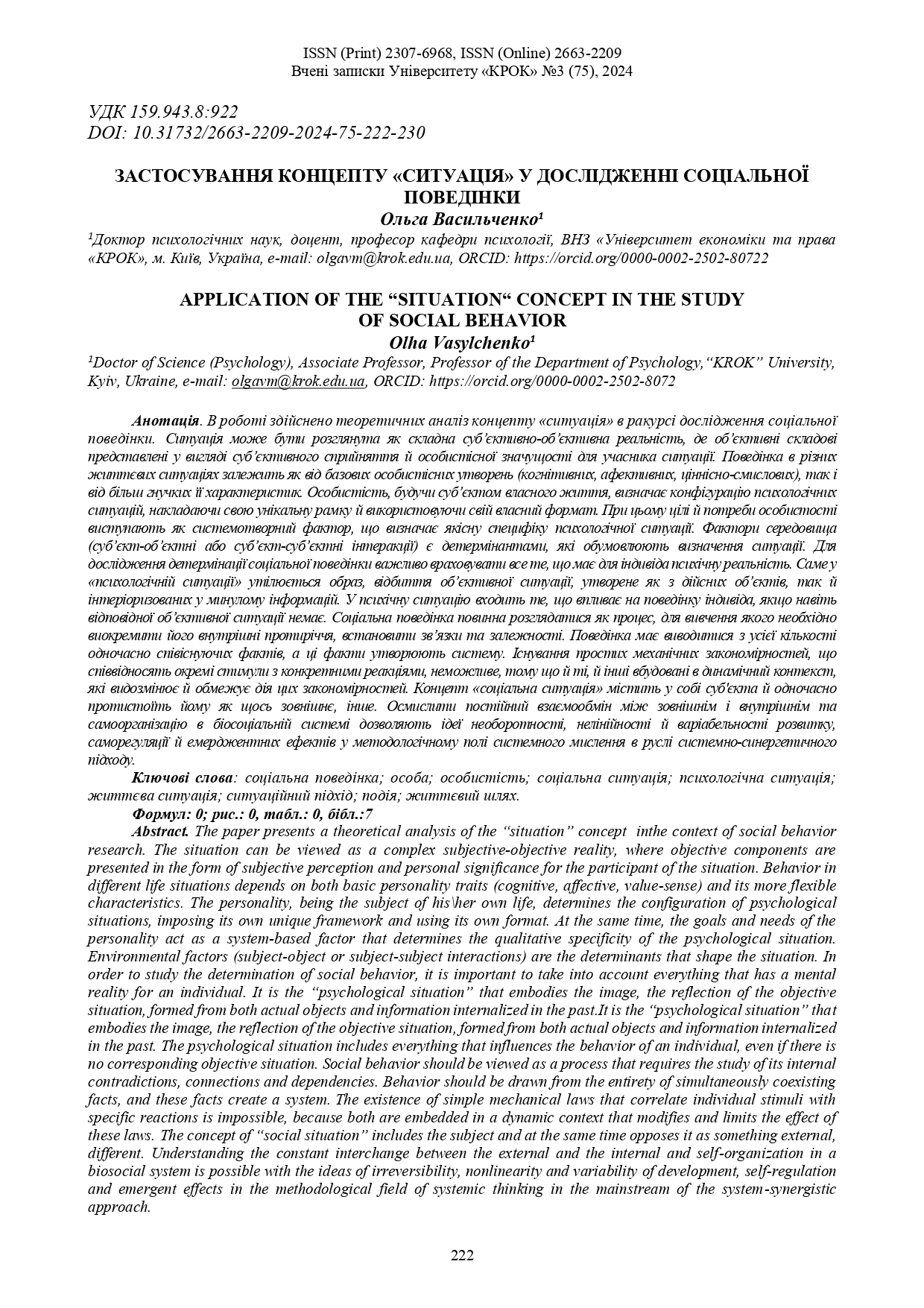APPLICATION OF THE “SITUATION“ CONCEPT IN THE STUDY OF SOCIAL BEHAVIOR
DOI:
https://doi.org/10.31732/2663-2209-2024-75-222-230Keywords:
social behavior, person, personality, social situation, psychological situation, life situation, situational approach, event, life pathAbstract
The paper presents a theoretical analysis of the “situation” concept inthe context of social behavior research. The situation can be viewed as a complex subjective-objective reality, where objective components are presented in the form of subjective perception and personal significance for the participant of the situation. Behavior in different life situations depends on both basic personality traits (cognitive, affective, value-sense) and its more flexible characteristics. The personality, being the subject of his\her own life, determines the configuration of psychological situations, imposing its own unique framework and using its own format. At the same time, the goals and needs of the personality act as a system-based factor that determines the qualitative specificity of the psychological situation. Environmental factors (subject-object or subject-subject interactions) are the determinants that shape the situation. In order to study the determination of social behavior, it is important to take intoaccount everything that has a mental reality for an individual. It is the “psychological situation” that embodies the image, the reflection of the objective situation, formed from both actual objects and information internalized in the past.It is the “psychological situation” that embodies the image, the reflection of the objective situation, formed from both actual objects and information internalized in the past. The psychological situation includes everything that influences the behavior of an individual, even if there is no corresponding objective situation. Social behavior should be viewed as a process that requires the study of its internal contradictions, connections and dependencies. Behavior should be drawn from the entirety of simultaneously coexisting facts, and these facts create a system. The existence of simple mechanical laws that correlate individual stimuli with specific reactions is impossible, because both are embedded in a dynamic context that modifies and limits the effect of these laws. The concept of “social situation” includes the subject and at the same time opposes it as something external, different. Understanding the constant interchange between the external and the internal and self-organization in a biosocial system is possible with the ideas of irreversibility, nonlinearity and variability of development, self-regulation and emergent effects in the methodological field of systemic thinking in the mainstream of the system-synergistic approach.
Downloads
References
Балл Г.А. (2006). Психология в рациогуманистической перспективе: Избранные работы. К.: Изд-во «Основа».
Балл Г.О. (2011). Трактування вчинку в теоретичному доробку С. Рубінштейна і В. Роменця. Психологія і суспільсьво. № 2. С. 124–129.
Васильченко О. М. (2013). Репродуктивна поведінка особистості. Соціально-психологічний аналіз. Луганськ. Видавництво «Ноулідж»
Васильченко О.М. (2010). Застосування структурно-функціонального підходу до аналізу соціальної поведінки особистості. Актуальні проблеми психології: Збірник наукових праць Інституту психології ім. Г.С. Костюка НАПН України. Т.9, 5. 103–114.
Васильченко О.М. (2011). Застосування системного підходу до аналізу соціальної поведінки особистості. Актуальні проблеми психології: Збірник наукових праць Інституту психології ім. Г.С. Костюка НАПН України. Т.7, випуск 26. 44–55.
Роменець В.А. (1998). Історія психології XX століття. К.: Либідь.
Слюсаревський М.М. (2009). Ситуація як об’єкт соціально-психологічного дослідження: історіогенез і сучасний стан проблеми. Наукові студії із соціальної та політичної психології. Збірник статей. Інститут соціальної та політичної психології НАПН України. 23. 5–24.

Downloads
Published
How to Cite
Issue
Section
License

This work is licensed under a Creative Commons Attribution-NonCommercial 4.0 International License.

